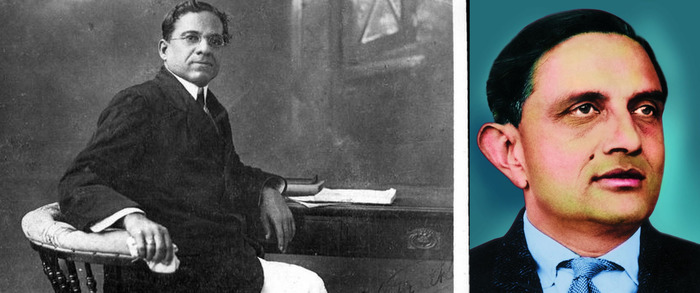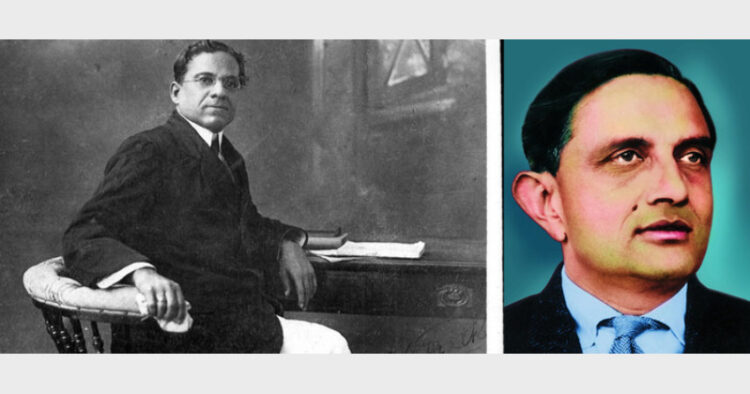It is the time as India touches a milestone to sensitise citizens to understand the roles such protagonists played in their respective sectors and thus guided and shaped the country’s history.

New Delhi: India has reasons to rejoice on the solemn occasion of the 75th Independence Day.
But there are some tales about a few stars who are seldom remembered and debated in public space in the media and today’s so common ‘social media’.
Perhaps it is also the time as India touches a milestone to sensitise citizens to understand the roles such protagonists played in their respective sectors and thus guided and shaped the country’s history.
Here we take two names from altogether varied streams–scientist Vikram Sarabhai and Dhundiraj Govind Phalke, who dreamt and finally materialised the world’s largest film industry.
VIKRAM SARABHAI
Scientist Sarabhai was often criticised for being a ‘dove’ vis-à-vis country’s nuke programmes, but it was also a fact that way back in 1956, he had suggested research works on missiles and Rockets.
His admirers would recall that Sarabhai (born August 12, 1919–death December 30, 1971) as the first man who gave the scientific and pragmatic philosophy of managing scientific institutions. He was the founder of the Indian Space Research Organisation.
Known as the original cradle of space sciences in India, Vikram Sarabhai founded the Physical Research Laboratory (PRL) in 1947. In those days, PRL and Sarabhai worked on cosmic rays.
Decades later, in 1975, when Indian Satellite Aryabhatta became a reality, of course, the country knew that Sarabhai was the man behind the show.
He had started a project for the fabrication and launch of the ‘Swadeshi’ satellite.
His philosophy on Science and Nation Building goals was perhaps best defined by his radio broadcast in 1965.
A person who had grown close to the country’s leadership and later Indira Gandhi in particular, he had underlined the need to provide ‘experience’ on a broader scale, whereby human beings could evolve values and ethics vis-à-vis social environments.
Secondly, he said there was a need to foster creativity and apply scientific skills and knowledge to build the economy and policymaking in defence and development.
Australia’s famous newspaper ‘Morning Herald’, on July 27, 1970, quoted Vikram Sarabhai as asserting that India could conduct underground nuclear explosions and that it was internationally entitled to do so as a non-signatory to the NPT.
Indeed, he and the then PM Indira Gandhi were on the same wavelength on the subject.
There are other tales about his ‘original’ out of box thinking.
When some complex inter-river disputes started in southern India and the Punjab region, he insisted that instead of judges (or courts), the scientists should be pressed into service to end the impasse.
He had also favoured a science-based integrated programme for the Brahmaputra-Ganga river system with the then East Pakistan (now Bangladesh).
DHUNDIRAJ GOVIND PHALKE
Another protagonist we would discuss is Dhundiraj Govind Phalke, known as Dadasaheb Phalke, an icon of India’s film world.
Born April 30, 1870, he was expired on February 16, 1944 — three years before India’s independence.
Today, he is also remembered for the highest film award given in his name to India’s film maestros.
The story of filmmaking in India began under his tutelage rather than by chance.
The story goes, he was impressed and awe-struck when he saw the film ‘The Life of Christ’.
As the images of Christ moved or rolled across in front of his eyes on the white screen, he began to visualise the same movements of Hindu Gods, Krishna and Ram. In effect, his films and images of Hindu Gods struck a chord with the viewers, and the magic followed.
This led to the start of Phalke’s career in filmmaking in 1910 and the emergence of Indian cinema.
It is today the world’s largest film industry.
Phalke made 95 feature-length films and 27 short films in his career. His most noted works being: Mohini Bhasmasur (1913), Satyavan Savitri (1914), Lanka Dahan (1917), Shri Krishna Janma (1918) and Kaliya Mardan (1919).
Of course, ‘Raja Harishchandra’ had an epochal effect.
Phalke wrote the script. Dattatraya Damodar Dabke played the lead role of King Harishchandra and Anna Salunke as Queen Taramati. The rest is history.
Born in Trimbak (Nashik), he had moved to Bombay and joined the J. J. School of Art.
Phalke was a versatile personality and learned photography and lithography. He became adept at illusionist tricks and so-called magic.














Comments